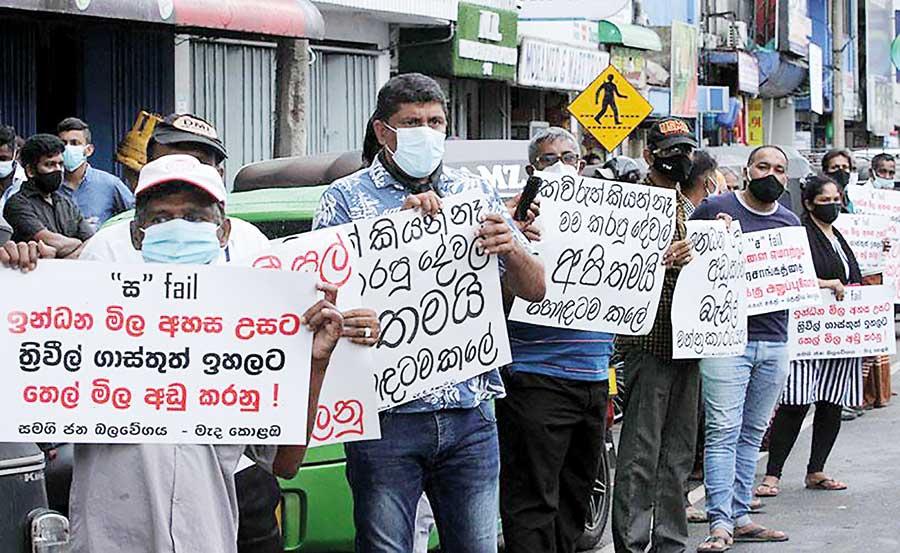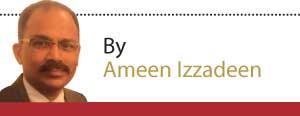Reply To:
Name - Reply Comment

Opposition party supporters protesting over rising cost of living. File pic.
The government’s inability to control rising consumer prices raises an existential question as to whether Sri Lanka is a welfare state.
is a welfare state.
With free education, free health service and now free COVID-19 vaccines, no doubt, Sri Lanka is a welfare state that has won accolades for great social development feats.
Moreover, election promises and manifestoes – though they are often not worth the paper they are printed on -- indicate every party which is aspiring to form a government wants to take the welfare state that Sri Lanka is to the next level. This has been the case since independence, although the people foolishly believe these unrealistic promises and vote for a political party only to realize they have been fooled once again. Election promises are part of a well-devised gimmick which political parties put before the people after much brainstorming by strategists, public relations experts and marketing wolves. We the people know that politicians lie, yet we believe what they say and vote for them. Who can be more stupid than the one who knows the truth, sees the truth and still believes in a lie? One wonders whether democracy is a government of the fools, for the fools and not by the fools but by political scammers.
The unscrupulous politicians have their say at elections and their way in government because in pseudo democracies such as ours, there is no legally binding mechanisms to hold politicians accountable for the promises they make. Perhaps, if we had laws to disqualify a party from contesting an election because it has dishonoured its promises, we the people would not have been fooled over and again. Since our un-statesmanlike politicos are not going to bring in such electoral law reforms, there should be at least a civil society movement to warn the people by naming and shaming political liars through an election time ranking system based on false promises they have given. Unfortunately, we have also not reached moral high ground in politics for our politicians to come before an independent panel consisting of eminent economists to explain during election time how they will find the money to fulfil the promises they make.
In the absence of such mechanisms, the big talk about strengthening the welfare state is just hogwash. When the government takes a defeatist attitude allowing black-marketers and the trade mafia to dictate prices, then it is seen to be shirking its responsibility as a custodian of the welfare state to protect the people. A welfare state is a type of governance in which the government plays a key role in the protection and promotion of the economic and social well-being of its citizens. A welfare state is based on the principles of equality of opportunity, equitable distribution of wealth, and public responsibility for those unable to avail themselves of the minimal provisions of a good life.
The government’s inability, rather than its unwillingness, to protect the people from pandemic-related shocks, has eroded social security a welfare state seeks to ensure. Some may say the government could have absorbed the price hike through subsidies and prevented a steep rise in the prices of essential items. True, Sri Lanka is among the countries worst hit by the COVID-19 pandemic. But the impact of the pandemic is felt by every country. Some countries have been hit harder than others, not because the virus had its favourites but because of economic mismanagement. In many countries, central banks and government economists came up with stimulus packages to put the pandemic-hit economies on a recovery path and they are yielding good results now.
In Sri Lanka, where many people have lost their jobs or are going through income losses, the President censured government economists for not coming up with a stimulus package. A task force was set up to revive the economy. But yet the government policy seems to have failed. Import controls, unchecked money printing and blunders made in pandemic control measures stem from ill-advised policy decisions of a government that came to power on a promise to set up an expertocracy -- a government by experts. The Viyath Maga movement appears to be a hyperbole though it projected itself as the ruling party’s army of scholars and experts. While the economy is in crisis, the government experimented with shock treatments such as imposing a ban on the import of chemical fertilizer, knowing well that chemical fertilizer was a necessary evil to ensure the country’s food security.
The government’s policy has also created oligopolies not only in the vital rice sector but also in less-spoken-about areas such as floor tiles, although free market principles promote fair trade and competition leading to price reduction benefiting the people.
Like Sri Lanka, Bangladesh was also badly hit by the pandemic. But Bangladesh’s economy managed to stay afloat, winning the World Bank’s praise for a job well done. “Despite the uncertainty created by COVID-19, the outlook for Bangladesh’s economy is positive,” a recent WB report said.
How Bangladesh has achieved this success should be an eye-opener. Countries like Bangladesh and Vietnam set up free trade zones to attract foreign investment long after Sri Lanka. Yet they are more successful than Sri Lanka. Bangladesh, in particular, has achieved success despite many challenges such as its propensity to natural disasters, political unrests and now the pandemic.
Sri Lanka’s economy with a widening trade deficit largely depends on tourism, Sri Lankan migrant workers’ remittances, exports and foreign investments -- sectors which are highly vulnerable to external shocks such as the pandemic and internal issues such as terror attacks. But as regards foreign investment, its initial success in attracting foreign investors has waned, despite the country having many advantages such as a highly literate work force, the use of English language, and a relatively good infrastructure such as ports, highways and communications facilities.
A country will not become a haven for foreign investors unless it addresses four key concerns: Bureaucratic deficiencies, corruption, political instability and protests with geopolitical undercurrents. Sri Lanka lacks a ‘one-roof’ administrative mechanism to expedite investments and is yet to emerge as an investor-friendly country that does not tolerate corruption. Although, there is political stability, protests over foreign investments are a concern for investors. These protests are not totally without geopolitical meddling. With Sri Lanka getting caught in the Indo-Pacific power struggle involving India, China and the United States, there is reasonable suspicion that the hidden hand of one big power or another is behind protests such as the ones the country has witnessed over China’s investments in various projects, Indian investments in the Colombo Port’s Eastern Terminal project --now the Western Terminal project and the Trinco oil farms-- and US investments in the Kerawalapitiya power plant.
In theory, the welfare state which our politicians are seen to be eager to promote during election time gives a human face to the economic policy whether it is market-oriented, liberal or state-controlled. Even the laissez faire system recognizes a tolerable level of state intervention in business to protect people. Therefore, it is not befitting a government worth its salt to leave the people at the mercy of racketeer traders.